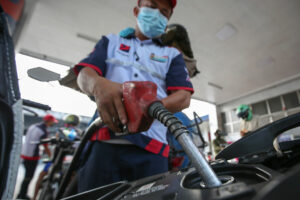Managing inflation, avoiding social unrest

A couple of days ago, US Fed Chairman Jerome H. Powell clarified before the Senate Banking Committee that the central bank was “not trying to provoke” a recession while admitting that it is “certainly a possibility.” To those who are incurably averse to tightening monetary policy, Powell’s clarification is very helpful in assessing the Fed’s thinking, even as one should agree it was hopelessly behind the curve. There is a cost to doing too late, and too little, and definitely, playing catch-up is not exactly neat.
Powell’s calvary began with his insistence that the creeping inflation early last year was only transitory. It turned out inflation was more long-lasting as it was broad in scope, with prices of goods and services rising by as much as 8.6% last month. Consumer expectations of higher prices led workers to demand higher wages and their employers to impose higher prices for their goods and services. That is how the inflationary cycle was motivated in the US, such that the Fed was forced to run apace with a 25-basis-point increase in March and 50 basis points in May and a massive 75 basis points this month.
There is no denying the fact that inflation has gone global due to skyrocketing fuel prices. For instance, GlobalPetrolPrices.com reported that in Germany, gasoline prices averaged €1.894 or $1.991 per liter as of June 20. At P54 to a dollar, that should be around P107.51 in the Philippines. A jeepney driver in Manila was quoted by the Associated Press (AP) to be spending $16.83 or P900 for diesel to run his vehicle before this oil price run-up. Today, he has to shell out $41.40 or P2,200. “That should have been our income already. Now there’s nothing, or whatever is left,” or only 40% of what he used to make.
More from AP: “A motorcycle taxi driver in Vietnam turns off his ride-hailing app rather than burn precious fuel during rush-hour backups. A French family scales back ambitions for an August vacation. A graphic designer in California factors the gas price into the bill for a night out. A mom in Rome, figuring the cost of driving her son to camp, mentally crosses off a pizza night.”
When habits and personal finances are altered by this latest round of huge oil price increases, inflation could be more entrenched. With the light at the end of the Russia-Ukraine war tunnel seeming to be distant, and the higher likelihood of another surge in COVID-19, the collateral effect on growth could not be trivial. Reducing consumption, the biggest determinant of economic growth, could also shave off several percentage points from domestic output and economic welfare.
Of course, US Treasury Secretary Janet Yellen argued that while she expected the US economy to slow down, “I don’t think a recession is at all inevitable.” She must be coming from the view that tightening monetary policy was aimed at stabilizing the US economy by addressing the risks to runaway inflation. It is the Russia-Ukraine war, high fuel prices, and supply chain snarls that undermined market sentiment for growth.
What do we make of that in the Philippines?
The recent editorial of the Philippine Daily Inquirer has an interesting take as captured by the question: What can be done by the incoming administration of Bongbong Marcos, Jr. to mitigate the impact of inflation on the lives of ordinary Filipinos this year and the next? We stress, as we stressed in the past, inflation inflicts pain on everybody but not everybody shares the same threshold for pain.
It is sad that some members of Congress would rather take the easy way out by proposing to suspend the collection of taxes on diesel, gasoline, cooking gas and other fuel products. While this move could bring immediate relief to consumers, both rich and poor, this would also reduce public revenues for equally important budget items for social services, capital spending, and infrastructure. More perverse is that while fuel taxes are proposed to be suspended, they are also opposing new taxes designed to help pay for the budget including the servicing of the P12.7-trillion national government debt.
In a recent blog, IMF’s David Amaglobeli, Emine Hanedar, Gee Hee Hong, and Celine Thévenot reported their survey of how member countries responded to the unprecedented surge in oil prices. Many countries limited the increase in domestic prices either by cutting corresponding taxes on these imported products or providing direct price subsidies. Both measures actually impinged on government budgets that had already been weakened by the two-year-old pandemic.
The best approach, based on the IMF study, is not to cap the price pass-through but to allow it while protecting the most vulnerable households. “That’s ultimately less costly than keeping prices artificially low for all irrespective of their ability to pay.”
More than half of the 134 member countries surveyed had at least one response to higher energy and food prices. In the case of the emerging and developing economies, there were fewer new policy measures, as the Fund noted, due perhaps to existing subsidies and policies to limit or avoid changes in local prices. But there were fewer attempts to limit the pass-through of higher global prices. The reason could either be smaller fiscal space or their ability to upgrade the social safety net could be constrained.
Limiting price-through could affect the good market decision to be more energy-efficient. Subsidizing consumer prices could encourage more consumption and in the process fuel higher energy prices.
What is more equilibrating is for a time-bound, targeted relief for the most vulnerable sectors of the poor as well as public transport drivers. A more efficient and less-prone-to-corruption modality of cash transfers should be explored. Local government units should be bypassed as much as possible.
In effect, we need to allow global oil prices to pass through to local prices and the way to mitigate it is to protect households and other sectors most likely to be seriously affected.
For the sake of our people and country, the incoming Marcos administration could very well consider the Fund advice to focus on investing in social safety nets and restructuring existing policies on subsidy. What can be expected from it is stronger resiliency and productive spending to ensure more sustainable and inclusive growth.
Failure of government to arrest runaway inflation and cushion its negative impact on the people’s economic welfare risks the possibility of social unrest. We should recall that the same issue of a gasoline price increase triggered the Diliman Commune of Feb. 1-9, 1971, even as it subsequently escalated into a military assault of the University of the Philippines. Even through the pandemic where social distancing protocols could be a disincentive for mass action, the IMF reported anti-government and anti-lockdown social unrest in Canada, New Zealand, Austria, and the Netherlands. This pandemic-related activism seems to be waning, but public frustration with sharply rising oil and food prices is bound to produce more social unrest of the kind we last saw some years ago.
This risk is growth-negative. Consumption is likely to level off because of uncertainty. Output is likely to be lost both in manufacturing and services. Foreign and domestic investors alike might be disincentivized from increasing their exposure in the economy, whether in manufacturing, mining, agriculture, or even in infrastructure.
It should therefore be no surprise that in previous surveys of the key concerns of Filipinos, it has always been inflation that topped the list. No, we don’t suggest that Marcos Jr. should take over the Bangko Sentral ng Pilipinas (BSP) because inflation is expected to breach the target this year and perhaps next year. The BSP is an independent constitutional agency. Most important, its Monetary Board and economists are more than competent to handle the job.
Diwa C. Guinigundo is the former deputy governor for the Monetary and Economics Sector, the Bangko Sentral ng Pilipinas (BSP). He served the BSP for 41 years. In 2001-2003, he was alternate executive director at the International Monetary Fund in Washington, DC. He is the senior pastor of the Fullness of Christ International Ministries in Mandaluyong.




